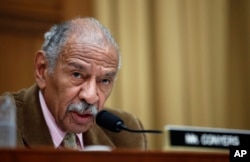In asking senior federal prosecutors to examine a number of Republican grievances, Attorney General Jeff Sessions is trying to strike a balance.
He appears to be attempting to placate a boss who has repeatedly suggested that Sessions' own job might be in jeopardy for failing to investigate his Democratic rivals. At the same time, Sessions is taking a step toward defending the Justice Department's credibility by leaving the actual work to senior officials whose findings, while unlikely to please everyone, would have more credibility.
In a letter this week, the department directed senior federal prosecutors to "evaluate certain issues" raised by Republican lawmakers. Among them: whether a special counsel should be appointed to look into allegations that the Clinton Foundation benefited from an Obama-era uranium transaction involving a Russian state company, a deal President Donald Trump himself has continually urged the Justice Department to investigate.
Unlike other members of the president's Cabinet, the attorney general is construed as mostly an independent operator, under longstanding policy, practice and executive protocol. The Justice Department is not supposed to be influenced by the White House in deciding which cases to prosecute and which to discard after a review. The department's top staff is a mix of career officials and political appointees who juggle investigations behind closed doors while working more publicly to advance the administration's law enforcement agenda.
Sessions may be trying to dig himself out of a bind with a move that allows him to say he handled the allegations properly by referring them to prosecutors, who could then credibly close the case without debasing the Justice Department. Neither the letter, signed by Stephen E. Boyd, an assistant attorney general, nor Sessions named the senior prosecutors who will be involved in the review sought by Republicans. But they will most likely be career officials accustomed to operating free from political sway.
While the term "senior prosecutor" could also refer to a politically appointed U.S. attorney, Sessions would face immediate backlash for putting the probe in the hands of a Trump-appointee.
Critics on both sides
But while this may offer Sessions a greater measure of job security for now, a hearing of the House Judiciary Committee on Tuesday showed he has so far satisfied very few of his critics.
Despite attempts to reassure Democrats to the contrary, the mere issuance of the letter immediately raised alarms that Justice was attempting to do the bidding of the president, who has publicly lamented that he has so little direct influence over the agency's affairs.
And Republicans, who have long called for an investigation of Hillary Clinton, questioned why a probe hasn't been under way by now.
"If you are now just considering it, what's it going to take?" Rep. Jim Jordan of Ohio asked Sessions during the five-hour oversight hearing where the issue consumed a great deal of the focus. Jordan said it looked like there was already enough evidence to appoint a special counsel.
"It would take a factual basis," Sessions said, adding that "`looks like' is not enough basis to appoint a special counsel."
The committee's top-ranking Democrat, Rep. John Conyers of Michigan, questioned whether Sessions was being improperly influenced by Trump. Sessions said several times that any such review involving Hillary Clinton would be done without regard to political considerations.
"I have not been improperly influenced and would not be improperly influenced," Sessions declared. "The president speaks his mind. He's bold and direct about what he says, but people elected him. But we do our duty every day based on the law and the facts."
Presidents for decades have taken care to avoid being seen as meddling in Justice Department affairs, though they on occasion have expressed personal opinions about specific investigations. President Barack Obama, for instance, once said that there was "not even a smidgen of corruption" at the Internal Revenue Service — even as the FBI was still investigating. And he also contended that Hillary Clinton's use of a private email server hadn't harmed national security.
Trump, however, has shown little concern for the traditional boundary between the White House and the Justice Department, tweeting just last week: "People are angry. At some point the Justice Department, and the FBI, must do what is right and proper. The American public deserves it!"






